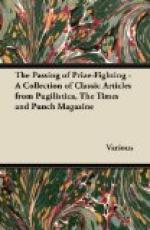Here and there the symbolism was obvious to the point of crudity; but you searched in vain for a consistent scheme. The father in his banknotes lashed to a ponderous safe was an easy personification of the slavery of wealth, and the pantomime ducks and drakes were simple to understand as symbolizing the career of a spendthrift (though the father was never that); but why, you asked, did the double-faced nurse exhaust all her spare moments and our patience pirouetting about the stage? Did she represent the levity of the dual life? Not at all; her actions bore no moral significance: she was just giving a literal illustration of a phrase—“to dance attendance.”
I don’t know how the children in the audience appreciated all this, but I confess that some of it left me wondering whether my intelligence was too raw or too ripe for the fancies of this Wonder-Zoo-Land.
The First Act, which showed the child’s life at home, had fallen altogether flat; but the Third, in which she wakes in her pretty bedroom, restored from the jaws of death to her repentant parents, put us on better terms with ourselves, for we were not really hard to please. The sweetness of it was perhaps a little cloying, but it was all quite nice and sympathetic. Still, I am afraid I agreed more than I was meant to with the speech of pretty little Miss STEPHANIE BELL, when she told us before the curtain that they would cable to the author in America to say how glad we were that it was all over.




